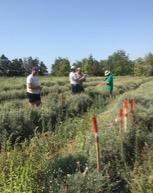Guayule: a rubber-producing plant in the process of adaptation to the Mediterranean climate
The Agroguayule project (ADEME-GRAINE, 2019-2022) structures activities on guayule between UMRs AGAP (BURST, PHIV, GABA, CRB GamèT et DDSE) and Biowooeb, a rubber-producing plant under adaptation to the Mediterranean climate.
The global health context has revealed the vital challenge of mastering strategic sectors at the local level and in their entirety. Guayule has a potential for local rubber production and valorization in the medical field. The activities carried out concern the optimization of seed quality, the determination of the ploidy level, the study of intra-specific variability, the physico-chemical characteristics in the biomass, as well as the modeling of the value chain.
The Tropical Biological Resource has allowed the introduction of diploid seeds and related species from USDA. These plants were planted on the Lansargues plot (Figualex). In the guayule, reproduction by seed is strongly related to the level of ploidy of the accessions. It is sexed at the diploid level but strongly apomictic at the higher ploidy level while not excluding a certain proportion of sexed seeds with major consequences on the germinative capacities of the seeds and the genetic stability of the germinated plants. The ploidy of guayule samples was determined by flow cytometry (PHIV). The selection of the first elite clones has been possible and clonal propagation is being tested by cuttings. Two complementary approaches are proposed for biomass characterization: a global approach (metabolomics) and a targeted approach by analytical chemistry, imagery and SPIR spectroscopy. Sampling has been started for 8 genotypes in 2020 and will continue in 2021.
Published: 19/01/2021

